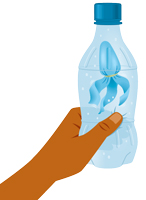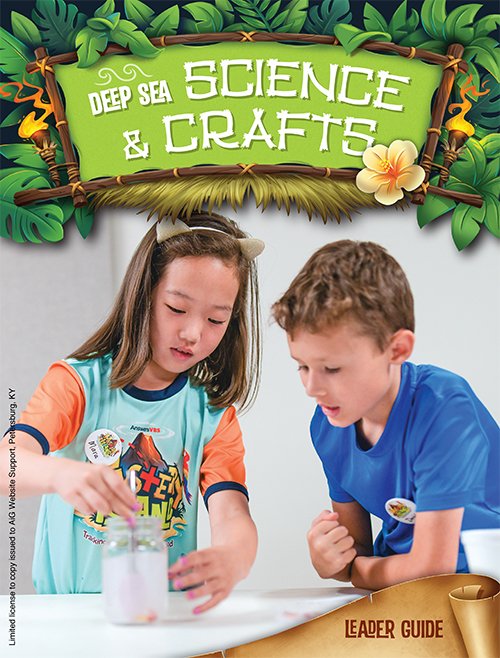Diving Octopus
Day Two Experiment
on November 22, 2021; last updated November 30, 2021Materials (for every group of 3–4 students)

- Empty 16-oz. bottle and lid (Sparkling Ice® drink bottles work well)
- 2-ml disposable transfer pipette
- 2 8-mm flat washers
- Disposable nitrile glove
- Small, clear rubber band (used for hair)
- Electrical tape
- Plastic container of water
- Small plastic balls that float, like ball pit balls
Pre-Prep
Fill the bottle until it’s full of water. Place the washers securely on the transfer pipette. Cut off the excess pipette tip. Use a finger of the disposable glove to cover the bulb of the pipette, securing it with a small, clear rubber band. Cut the finger of the glove to resemble octopus arms. Partially fill the pipette with water. You can test the buoyancy of the pipette in a separate cup of water. Your pipette should barely float. Adjust the water in the pipette if yours sinks to the bottom of the cup. Once you have the right amount of water in the pipette, place it into the full bottle of water and close the lid tightly. Test the system to ensure the pipette sinks when the bottle is squeezed. Finally, use electrical tape to seal the lid of the bottle. Put water in the plastic containers. Place the bottles with the “octopuses” and the balls and plastic containers of water on the tables.
Teaching Tie-In
Have you ever done a cannonball into a pool? Take responses. How about jumping off a diving board feet first? Take responses. How about an actual dive into a deep pool? Take responses.
Well, today we’ve got a diving octopus we’re going to check out as we talk about how pressure affects him. The octopus is an amazing creature God designed. It is a master of disguise and can hide in the ocean, changing color and almost becoming invisible as it blends in with its background. It’s also able to withstand the pressure of the ocean and jet away quickly through the water if need be.
God made over 150 species of octopuses, and he knows about every one of them. He knows when each octopus is hiding and when it is jetting away. He knows when it is going up and when it is going down. Let’s check out our diving octopus and hear more.
Class Time Directions
Let’s take turns squeezing the bottle that’s in front of you. Notice what happens to the octopus each time the bottle is squeezed. Do so. Why do you think the octopus sinks? Take responses. When you squeeze the bottle you are putting pressure on it and that forces water up into the octopus. This octopus has an air bubble inside of it that’s helping it float in place. But when more water is forced into the octopus, it makes the air bubble get smaller. With more water inside, the octopus becomes more dense and can’t float anymore, so it sinks to the bottom. The scientific principle that explains why the pressure causes the octopus to sink every time is called Archimedes’ Principle. Archimedes’ Principle basically says when something is immersed in water, the water pushes it with an upward force even as gravity is pulling it down. Whether something sinks or floats depends on which force is stronger. Another way to say this is that things that are more dense than water will sink, and things that are less dense will float. Let’s try another example.
Give them a container of water and a plastic ball. Try to push the ball down in the water and feel the water pushing it with an upward force. This is another example of Archimedes’ Principle. The ball is less dense than the water, so the water displaced by the ball has more upward force on the ball than gravity pulling it down.
As we mentioned the other day, it’s cool to do science experiments like this one based on Archimedes’ Principle because we can do the same experiment over and over and get the same results. Or we can go somewhere else and do this same experiment and the results will be the same. That’s because the scientific laws behind these principles never change. Who does that remind you of? Take answers. That’s right—God! God never changes, and he is full of truth. So when you learn about scientific principles at school, think of how the Creator of those laws never changes.
Tip Corner
- You may want to have small towels available to dry hands after they push the ball down in the container of water.
- A science term introduced today is Archimedes’ Principle.
Mystery Island Deep Sea Science & Crafts
Kids love science experiments and crafts! This guide contains everything you need to coordinate the daily science experiments and crafts for all age groups.
Browse Kids Book- © 2024 Answers in Genesis
- Privacy Policy
- Contact
- About

